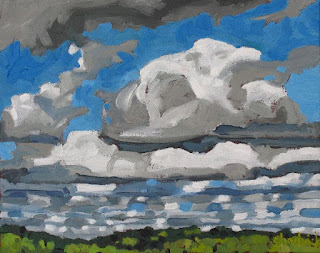 |
| #0839 "Cold Air Mass Cumulus" |
There are four forces required to really understand the wind.
- The pressure gradient force (PGF) varies with the contrast in pressure and points toward low pressure.
- The Coriolis force defects moving parcels to the right (Northern Hemisphere); varies with the speed.
- The Centrifugal force varies with the curvature and always points toward the centre of that curvature. The Centrifugal force influences the relative strength of the gradient and geostrophic balances.
- Friction turns the wind to lower pressure… the more friction… the more turning.
 |
| The Wind Balance of Forces including Friction |
"Another Look at the Wind" explained how to use your Coriolis arm to understand the wind in the free atmosphere. We can use that same approach to understand the influence of friction in the PBL. Friction simply slows the air down. A rough surface like a forest is more effective than a lake in slowing the wind down. Using your arms and body to approximate the balance of forces to create winds is another reason why weather is a ballet.. a dance and not a battle.
Consider your Coriolis Arm that is attached to your Coriolis Hand. Align your arm with the gradient wind at the top of the PBL. Hold your Coriolis Hand outward with your fingers pointing in the direction of the gradient wind, your palm facing down and your thumb stretched at 90 degrees. Your thumb must point in the direction of the pressure gradient force (PGF) at all times. As you descend toward the earth's surface (in your mind), you start to encounter friction. The wind slows down but wants to stay in balance. The wind tries to keep blowing as fast as it did by turning to flow more toward the low pressure - down the pressure mountain. Your Coriolis arm will turn toward the lower pressure but keep your thumb pointing in the same direction that it was at the start - the direction of the PGF. The effects of friction is approximated by the angle that your thumb makes with the rest of you Coriolis arm and fingers.
 |
| Your Coriolis Arm Can Illustrate the Impacts of Friction Too |
Now we know the wind...
Warmest regards and keep your paddle in the water,
Phil the Forecaster Chadwick

No comments:
Post a Comment